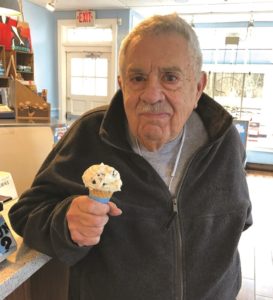EASTHAM — Elaine Lipton got a call from an in-home aide who’d arrived to cook dinner for her 85-year-old dad and found his home empty. The car was gone, but Carl Lipton’s walker and cell phone were there. This was early 2019; Carl hadn’t driven for at least two years. A Parkinson’s diagnosis kept him off the road.
“Is he with you?” the aide asked. He wasn’t.
It was a Monday — “scallop night” for the Liptons. Elaine stopped at Mac’s Market, hoping her father had gone there to pick up fresh scallops. No luck.
She circled back home and called the police, who put together a Cape-wide map of Carl’s landmarks. Before he stopped driving, where would he run errands? Old stomping grounds?

The aide and her boyfriend, a landscaper, put together their own search party, dispatching a fleet of trucks from his business. Meanwhile, Elaine scrolled through her father’s phone for clues. His last call had been to friends in Tucson, Ariz., though they hadn’t answered.
When Elaine alerted the police to this, they expanded their search to the bridges. The camera feed at the Sagamore returned zero matches for Carl’s license plate. Ditto for the Bourne Bridge.
About an hour later, a familiar car rolled into the Liptons’ driveway.
Carl had been headed to Tucson for a lunch date. He made it as far as Exit 6, when the gas light blinked on. A realization then struck him: he’d forgotten his phone, walker, and wallet. He pulled a U-turn and came home.
Elaine stormed down the driveway and ordered her dad to cut the engine. “He had the most sheepish smile on his face,” she said, “as if he was this mischievous kid.”
Molly Perdue, a founder of the Alzheimer’s Family Support Center of Cape Cod, had her own experience with a wandering senior when her late mother, Virginia Pickard, woke up one morning at 4:30 and shuffled barefoot through Provincetown. She thought it was time for church. Her mother, remarked Perdue, “was a great teacher” on the subject of how to support people coping with Alzheimer’s disease.
Dementia and cognitive decline impair memory and can cause disorientation. People with this condition sometimes wander or become agitated. And when police officers respond to calls involving dementia, they can find themselves in stressful encounters.
Perdue prepares officers and EMTs for this type of 911 call in all-day conferences. When it comes to the cognitive loss associated with dementia, “expectations don’t change,” Perdue said, “and there’s no accommodation in the community.”
“Twenty years ago, everyone just kept their blinders on when dementia calls came up,” said Sgt. Josh Adams of the Eastham police. “There’s not one officer in Eastham who hasn’t learned something from these trainings.”
Mainly, he explained, the effect has been to make officers more prepared to serve as intermediaries whose job it is to make a situation safe, then connect people to the health or other resources they really need.
Adams said he has noticed a promising trend: once linked up with the right resources, formerly frequent callers become less likely to dial 911.
The Eastham police also offer a SafetyNet bracelet, worn as a wristlet or anklet. To aid search and rescue efforts, it emits a radio frequency signal 24/7, which is detectable even if a client ventures into shallow water, a thick forest, or a concrete building. Unlike cellular or GPS trackers, radio waves are not tethered to a cell tower or satellite signal.
In the process of learning how to better support people with dementia, the Eastham department has reckoned with certain shortcomings in its response protocols — particularly when matters of behavioral and mental health enter the equation. One longstanding practice that’s been re-evaluated in this context: pulling up curbside with flashing lights and wailing sirens.
Perdue teaches officers to be aware that, when they arrive on the scene, “a lot of sensory information comes at once,” which can be hard for people with dementia to process.
Now, when officers respond to homes where residents are known to suffer from dementia or other cognitive or mental health issues, they receive a caution message reminding them to shut off lights and sirens before arriving. This practice also helps when assisting children with Asperger’s and autism. “We want to avoid agitating these people and putting them in a worse state of mind,” Adams said.
Arriving with less fanfare is only a first step. Perdue also coaches officers on subtleties in their interactions, especially tone, and how it pairs with body language. “Are your arms crossed?” Perdue asks. “You want to keep your body language open.”
Consider your face, Perdue suggests. “Are you smiling or frowning? Are you moving slowly? Or are you frantic?” She says, “Those with dementia will look at your face to gauge: ‘Are you here to help me or to harm me?’
“There’s a lot of fear that gets generated when you can’t rely on your cognition to make sense of situations,” Perdue says, “so reassuring someone in those moments is really important.”
Carl Lipton died in the summer of 2019. His daughter Elaine knows that she cared for him well, but she admits she’s chagrined about some of their interactions.
“What were you thinking?” she remembers bellowing as they stood on their front porch after his misadventure. “He felt really bad,” Elaine said, though, “deep down, I’m sure it felt like his last joyride.”
Perdue’s point for the police is one everyone could take to heart: “Sometimes, while trying to provide safety and security, we lose sight of how we’re doing that.”



